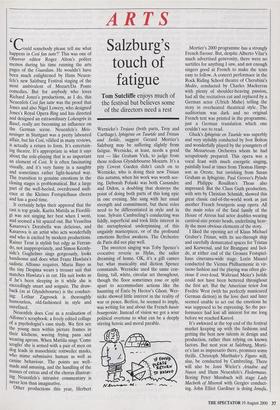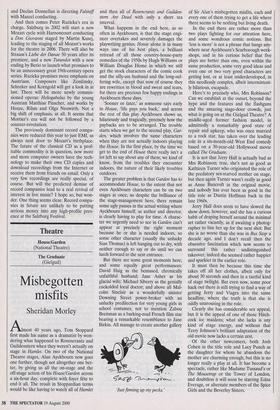ARTS
Salzburg's touch of fatigue
Tom Sutcliffe enjoys much of the festival but believes some of the directors need a rest Could somebody please tell me what happens in Cosi fan tutte?' This was one of Observer editor Roger Alton's politer memos during his time running the arts pages of the Guardian. He wouldn't have been much enlightened by Hans Neuen- fels's new Salzburg Festival staging of the most ambivalent of Mozart/Da Ponte comedies. But for anybody who loves Richard Jones's productions, as I do, this Neuenfels Cosi fan tutte was the proof that Jones and also Nigel Lowery, who designed Jones's Royal Opera Ring and has directed and designed an extraordinary Lohengrin in Basel, really are becoming an influence on the German scene. Neuenfels's Meis- tersinger in Stuttgart was a pretty laboured affair, but his Cosi, vilified in many reviews, is actually a return to form. It's entertain- ing theatre. It's appropriate in what it says about the role-playing that is so important an element of Cosi. It is often fascinating visually, and it's very funny in a naughty and sometimes rather light-hearted way. The transition to genuine emotions in the closing stages is problematical. But a large part of the well-heeled, overdressed audi- ence at the Kleines Festspielhaus cheers and has a good time.
It certainly helps their approval that the cast is top grade. Karita Mattila as Fiordili- gi was not singing her best when I went, and seemed a bit spaced out. But Vesselina Kasarova's Dorabella was delicious, and Kasarova is an artist who acts wonderfully and who is excited by modem productions. Rainer Trost is stylish but edgy as Ferran- do, not inappropriately, and Simon Keenly- side's Guglielmo sings gorgeously, looks handsome and does what Franz Hawlata's sadistic Alfonso requires. Maria Bayo as the tiny Despina wears a trouser suit that matches Hawlata's in cut. His suit looks as if he's been sleeping in it while she is exceedingly smart and soignee. The draw- back (as at Glyndebourne) is the conduct- ing: Lothar Zagrosek is thoroughly humourless, old-fashioned in style and unrefined.
Neuenfels does Cosi as a realisation of Alfonso's scrapbook: a freely edited collage of a psychologist's case study. We first see the young men within picture frames in their kitchens, waving frying pans and wearing aprons. When Mattila sings 'Come scogfio' she is armed with a pair of men on dog leads in masochistic rottweiler masks, who mime submissive human as well as canine behaviour. The points are well- made and amusing, and the handling of the masses of extras and of the chorus illustrat- ing Neuenfels's intrusive commentary is never less than imaginative. Other productions this year, Herbert Wernicke's Trojans (both parts, Troy and Carthage), 1phigenie en Tauride and Tristan and Isolde, suggest Gerard Mortier's Salzburg may be suffering slightly from fatigue. Wernicke, at least, needs a good rest — like Graham Vick, to judge from those tedious Glyndebourne Mozarts. It's a pity Covent Garden didn't catch on to Wernicke, who is doing their new Tristan this autumn, when his work was worth see- ing. Deborah Polaski was both Cassandre and Didon, a doubling that destroys the point of doing both parts of this long epic in one evening. She sang with her usual strength and commitment, but these roles need to be differentiated in style and in tone. Sylvain Cambreling's conducting was fiddly, superficial and took little interest in the metaphysical underpinning of this ungainly masterpiece, or of the profound emotions Berlioz awakens. The Orchestre de Paris did not play well.
The sweetest singing was Toby Spence's evocative reverie as Hylas, the sailor dreaming of home. OK, it's a gift cameo but what musicality and diction Spence commands. Wernicke used the same con- fining, tall, white, circular set throughout, though the floor sometimes rose or split apart to accommodate actions like the haunting of En& by Hector's Ghost. Wer- nicke showed little interest in the reality of war or peace. Berlioz, he seemed to imply, was writing for and about the French haute bourgeoisie. Instead of vision we got a sour political overtone to what can be a deeply stirring heroic and moral parable. Mortier's 2000 programme has a strongly French flavour. But, despite Alberto Vilar's much advertised generosity, there were no surtitles for anything I saw, and not enough singers good at French to make the texts easy to follow. A concert performacc in the Rock Riding School theatre of Cherubini's Medee, conducted by Charles Mackerras with plenty of shoulder-heaving passion, had all the recitatives cut and replaced by a German actor (Ulrich Muhe) telling the story in overheated theatrical style. The auditorium was dark and no original French text was printed in the programme, just a German translation which one couldn't see to read.
Gluck's 1phigenie en Tauride was superbly and very stylishly conducted by Ivor Bolton and wonderfully played by the youngsters of the Mozarteum Orchestra whom he had scrupulously prepared. This opera was a vocal feast with much energetic singing, painfully loud at times from Thomas Hamp- son as Oreste, but ravishing from Susan Graham as Iphigenie. Paul Groves's Pylade and Philippe Rouillon's Thoas also impressed. But the Claus Guth production, with sets by Christian Schmidt, showed this great classic end-of-the-world work as just another French bourgeois soap opera. All the main roles of the fatal family of the House of Atreus had actor doubles wearing carnival-size potato heads, underlining heav- ily the most obvious elements of the story.
I liked the opening act of Klaus Michael Gruber's Tristan, with its see-through ship and carefully demarcated spaces for Tristan and Kurwenal, and for Brangane and Isol- de, at either end of the Grosses Festspiel- haus cinerama-wide stage. Lorin Maazel conducted the Vienna Philharmonic in vir- tuoso fashion and the playing was often glo- rious if over-loud. Waltraud Meier's Isolde could not have been bettered throughout the first act. But the American tenor Jon Fredric West (with his perfectly manicured German diction) in the love duet and later seemed unable to act out the emotions he was supposed to be expressing. So the per- formance had lost all interest for me long before we reached Kareol.
It's awkward at the top end of the festival market keeping up with the fashions and getting the best new talents in design and production, rather than relying on known factors. But next year at Salzburg, Morti- er's last as impresario there, promises some thrills. Christoph Marthaler's Figaro will, alas, be conducted by Cambreling. There will also be Jossi Wieler's Ariadne auf Naxos and Hans Neuenfels's Fledermaus. Boring Peter Mussbach will stage Lady Macbeth of Mtsensk with Gergiev conduct- ing. John Elliot Gardiner is doing Jenufa, and Declan Donnellan is directing Falstaff with Maazel conducting.
And then comes Peter Ruzicka's era in charge. Salzburg in 2002 will start a new Mozart cycle with Harnoncourt conducting a Don Giovanni staged by Martin Kusej, leading to the staging of all Mozart's works for the theatre in 2006. There will also be Strauss's Liebe der Danae 50 years after its premiere, and a new Turandot with a new ending by Berio to launch what promises to be an unnecessary great 19th-century opera series. Ruzicka promises more emphasis on Austrians. Composers like Zemlinsky, Schreker and Korngold will get a look in at last. There will be more newly commis- sioned operas; Heliogabalus by the young Austrian Matthias Pinscher, and works by Henze, Rihm and Olga Neuwirth. Not a big shift of emphasis, at all. It seems that Mortier's era will not be followed by a counter-revolution.
The previously dominant record compa- nies were reduced this year to just EMI, as always next door to Mozart's birthplace. The future of the classical CD as a prof- itable commodity is in question, now more and more computer owners have the tech- nology to make their own CD copies and download recordings from the Internet or receive them from friends on email. Only a very few recordings are really special, of course. But will the predicted demise of record companies lead to a real revival of interest in live music? I hope so, but won- der. One thing seems clear. Record compa- nies in future are unlikely to be putting serious money into any high-profile pres- ence at the Salzburg Festival.



























































 Previous page
Previous page